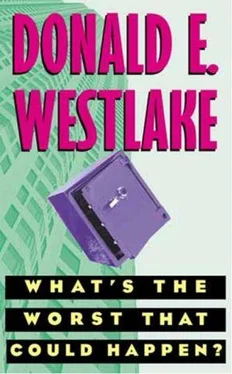So the drapes would stay closed. Every once in a while, a battle would take place out there on the Battle-Lake, unseeable beyond the drapes, and during the period of explosions, and the roaring of the crowd, Max and his guards would pace more restlessly than ever inside this prison, the guards with hunted looks, their hands hovering over their sidearms as the cannonades sounded all around them. But other than during those battles, there was no way to tell for sure that there was anything at all in the entire world outside this apartment. They might as well be on an asteroid in the asteroid belt, the last human beings in existence.
A knock on the door. Max at once removed himself to the kitchen doorway, feeling ashamed of his caution, but knowing nonetheless that caution was his only friend at this moment. One of the guards crossed the room to cautiously—caution was everybody’s friend in this cottage—open the door.
A murmur of voices. The guard stepped back, and a dapper black fellow in a tux came in, with a clipboard in his hand and a gold nametag reading JONES on his left lapel. “Evening, sir,” he said, with a broad toothy smile and a slight bow of the head in Max’s direction.
Max grimaced in return. Evening? It was after midnight, and nothing had happened yet. He could almost wish this was the burglar himself, or at least one of his friends.
“Housekeeping,” the guard explained to Max, unnecessarily.
“Just checking,” the fellow from Housekeeping said, still with that broad smile, “to be sure everything’s all right.”
“Everything’s,” Max said savagely, “hunky-dory.”
“Well, we’ll just look around,” the fellow from Housekeeping said. “With your permission, sir?”
“Go ahead,” Max told him, and moved out of the kitchen doorway, so the fellow could go in.
The guard had already returned to his conversation in the conversation area, and now Max went over there to say, “You recognized him, did you?”
The guard had just resumed his seat on one of the sofas, but now he stood and said, “Sir?”
“The fellow from Housekeeping,” Max said. “You recognized him.”
“No, sir,” the guard said. “Why would I recognize him?”
Max only now looked at the shoulder patch on the guard’s uniform, and realized it did not say Gaiety Hotel, Battle-Lake and Casino, it said Markus Plaza, which happened to be a shopping mall owned by TUI outside Phoenix, Arizona. So he was part of the extra security force brought in for the occasion.
Max now looked more carefully at the other guards’ uniforms and shoulder patches. He said, “None of you work here at the Gaiety?”
“No, sir,” they said. “No, sir.”
“So you won’t recognize bona fide employees of the Gaiety,” Max said.
“Well,” the first guard said, “they have to show us ID.”
“Did that fellow show you ID?”
“His nametag, sir.” The guard, who was himself black, cleared his throat and said, “Uh, the guy you’re waiting on, he’s white, isn’t he?”
“Well . . . yes.”
“So,” the guard said, and shrugged.
“But why,” Max demanded, “aren’t there people from the Gaiety in here, who know what the other employees look like?”
The guards looked at one another. One of them said, “Mr. Fairbanks, sir, we couldn’t take over for them. We wouldn’t know their jobs. We’re extra security on account of you, so we’re assigned to you.”
“The people outside as well? Around the perimeter?”
“Yes, sir,” they said. “Yes, sir.”
Max frowned deeply, thinking about this. He wanted to blame Brandon Camberbridge, accuse the man of keeping the most knowledgeable guards for his hotel instead of using them to protect the boss, but he did understand the orders would have come from Earl, and it did make sense to keep the hotel staff at its normal duties. “If a white person tries to get in here,” he said, “check his ID.”
“Yes, sir,” they said. “Yes, sir.”
Max walked back over to the kitchen doorway, and looked in. The fellow from Housekeeping was washing the dirty dishes in the sink. Looking over toward Max, his inevitable smile now apologetic, he said, “Won’t take a minute, sir. This should have been taken care of.”
“Very good,” Max said. He was pleased to see someone who took an interest in his work.
“I’ll be back a little later with the supplies you need,” the fellow said. “For now, I’ll just finish up in here, check the bedrooms and baths, and be out of your way.”
“There’s someone asleep in the second bedroom.”
“I’ll be as quiet as a mouse,” the fellow promised, and flashed that big smile again as he stood over the sinkful of soapy water. “I’ll be in and out of there, he’ll never even know I’m around.”
It was such a temptation to make off with the sleeping guard’s handgun, but Herman resisted the impulse. He was here on reconnaissance only, and would be coming back later, so pilfering pistols would not be a good idea.
Herman Jones, formerly Herman Makanene Stulu’mbnick, formerly Herman X, finished stage one of his reconnaissance, thanked Max Fairbanks for his patience, and was ushered out of the cottage by the same brother who’d admitted him. Two more guards, one a brother and one not, escorted him from the cottage to the main path, where he thanked them for their courtesy, assured them they’d see him later, and moved jauntily away, toward the main building of the hotel.
For Herman Jones, subterfuge at this level was child’s play, was barely deception at all. Back in the old days when he’d been actively an activist, when he’d been X and most of his jobs had been selfless heists to raise money for the Movement, so that he barely had time left to steal enough to keep his own body and soul together, he’d constructed an entirely false cover life to live within, full of nice middle-class friends of all races who believed he was something important and well-paid in “communications,” a word that, when he used it, sometimes seemed to suggest book publishing, sometimes the movies or television, and sometimes possibly government work.
Later, when he’d been in politics in central Africa, vice president of Talabwo, a nation where your Swiss bank account was almost as important as your Mercedes-Benz and where the only even half-educated person within five hundred miles who was not trying to overthrow the president was the president, and where if the president went down the vice president could expect to share with him the same shallow unmarked grave, Herman had learned a level of guile and misdirection that Americans, had they been able to observe it, could only have envied.
So now that he was home, no longer devoted to turning over the proceeds of all his better heists to the Movement (mainly because the Movement seemed to have evaporated while he was away), and no longer having to deal with politicians and army men (most of them certifiably insane) day and night, Herman was ready to turn his hard-earned expertise to for-profit crime.
Which was why he was here. He’d only worked with John Dortmunder twice before, but he’d enjoyed both jobs. The first time, he’d been brought into the scheme by Andy Kelp, whom he’d met in the course of various non-Movement enterprises, and the scheme was an interesting one, in which they’d stolen an entire bank, which had given him plenty of leisure time to work on the vault. The job hadn’t wound up to be an absolutely perfect success, but the group had been nicely professional and the experience basically a good one. The second time he’d been included into a Dortmunder job, it had been a scam, a little favor like this current one, but with less potential return.
Читать дальше












